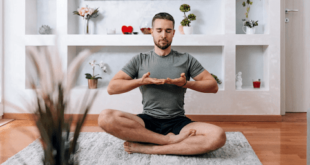Do you have trouble falling asleep at night? You’re not alone. Millions of Americans suffer from insomnia, and the effects can be devastating. Luckily, there are a few simple things you can do to fall asleep fast and get the rest you need. Follow these seven tips, and you’ll be on your way to a good night’s sleep in no time!
Does Melatonin work?
Melatonin is a hormone that helps to regulate the sleep-wake cycle. The body produces melatonin naturally, and levels of the hormone typically rise in the evening, making people feel sleepy. However, some people think melatonin doesn’t work. There are a few possible explanations for this phenomenon.
One possibility is that the body may not be able to absorb the synthetic form of melatonin in the same way as it does the naturally-occurring hormone. Additionally, melatonin supplements can interact with certain medications, reducing their effectiveness. Finally, it is also possible that people’s bodies simply become accustomed to taking melatonin supplements, meaning they no longer have the desired effect. Whatever the reason, it is clear that melatonin does not work for everyone.
Establish a bedtime routine and stick to it
One of the best ways to fall asleep fast is to establish a bedtime routine and stick to it. Going to bed and getting up at the same time every day helps set your body’s internal clock, so you’ll start feeling sleepy around the same time each night. Avoid watching television or working on the computer in bed; do something calming, like reading or taking a bath. And make sure your bedroom is dark, quiet, and cool about 65 degrees Fahrenheit is ideal.
The sleep environment plays a pivotal role in shaping an individual’s sleep routine. A comfortable and clutter-free bedroom with a comfortable mattress and bedding sets the stage for physical relaxation, making initiating and sustaining sleep easier. Also, when you shop dehumidifier for bedrooms, you’re investing in an appliance that can significantly improve the quality of your sleep environment.
A dehumidifier ensures a comfortable atmosphere, free from the discomfort of excess moisture. It also aids in allergy relief by reducing allergen-promoting conditions like mold and dust mites. The gentle hum of the dehumidifier serves as calming white noise, masking disruptive sounds and promoting better sleep. Additionally, it indirectly regulates room temperature, making the space more comfortable for rest.
Avoid caffeine and alcohol before bed
Both caffeine and alcohol can interfere with sleep, so it’s best to avoid them in the evening. Caffeine can stay in your system for up to eight hours, so if you have a cup of coffee at 2 P.M., it may still be affecting you when you go to bed at 10 P.M. Alcohol may make you feel drowsy at first, but it will disrupt your sleep later in the night.
Keep your bedroom calm, dark, and quiet
As we mentioned, your bedroom should be calm, dark, and quiet if you want to fast asleep. Excessive light or electronic screens in the sleep environment can disrupt the body’s natural circadian rhythm, making it challenging to adhere to a consistent sleep routine. Noise disturbances and extreme temperatures can lead to sleep disruptions. Use blackout curtains or an eye mask to block out light and earplugs or a noise machine to block out noise. This is especially important if you live in a city with a lot of ambient noise (traffic, construction, etc.).
Additionally, a dehumidifier keeps the bedroom calm by maintaining optimal humidity levels, preventing mold and mildew growth, offering a subtle cooling effect, and potentially providing white noise to mask disruptive sounds. These factors work together to create a more peaceful and conducive sleep environment, helping you achieve a calmer and more restful night’s sleep.
Stretch or do relaxation exercises before bed
If you’re having trouble falling asleep because you’re stressed out or keyed up from the day’s events, relaxation exercises can help calm your mind and body. You can try many different activities. Some people find that stretching works well, while others prefer deep breathing or progressive muscle relaxation (which involves tensing and relaxing different muscle groups). Try a few different techniques to see what works best for you.
Use a noise machine or earplugs to block out noise
If outside noise keeps you awake at night (traffic sounds, noisy neighbors, etc.), try using a noise machine or earplugs to drown it out. Many types of noise machines are available; some even double as white noise machines, which can help you struggle with anxiety or intrusive thoughts.
Drink chamomile tea before bed
Chamomile tea has long been used as a natural sleep aid. The herbal tea is brewed from dried chamomile flowers and contains compounds that have sedative effects. Chamomile tea is usually safe for most people, but if you’re pregnant or breastfeeding, check with your doctor before drinking it.
Use diffusers
Some scientists believe melatonin may not work because the body quickly becomes accustomed to it. Diffusers, on the other hand, will do the work. A diffuser is a small device that uses ultrasonic waves to vaporize essential oils. This creates a fine mist of oil and water particles that are then dispersed into the air. Diffusers are becoming increasingly popular to enjoy the benefits of essential oils, but they can also be used to improve sleep quality.
When used in the bedroom, diffusers can help to create a calming environment that promotes relaxation. The soothing scent of lavender, for example, is known to promote sleepiness and reduce stress levels. In addition, diffusing essential oils can help purify the air and reduce indoor pollutants. As a result, using a diffuser in the bedroom can be an effective way to improve sleep quality and promote relaxation.
Conclusion
If you’re struggling with insomnia, don’t despair, there are a few simple things you can do to fall asleep fast and get the rest you need. That’s why Establishing a bedtime routine, avoiding caffeine and alcohol before bed, and keeping your bedroom cool, dark, and quiet can all help you get a good night’s sleep. And if you’re still having trouble, try drinking chamomile tea or using a noise machine to block out external noise. With a little effort, you can get the rest you need and start feeling refreshed and well-rested in no time.
 eTopical Precious Finds
eTopical Precious Finds


